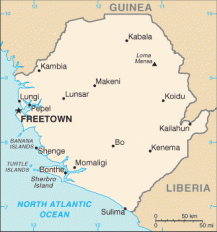A Portuguese explorer named Pedro de Cintra landed on the coast of Sierra Leone in 1460. He named the area Sierra Leone meaning “Lion Mountains” because of the beauty of its mountains (Middleton, John). In the 1800s, Sierra Leone was colonized by the country Britain. The British treated the Sierra Leoneans poorly. This treatment caused the Sierra Leoneans to up rise and fight against the British. On April 27 1961, Sierra Leone defeated the British and gained its independence.
Before Sierra Leone’s independence, the British imposed a hut tax on Africans to help pay for the colonial government; (Page, Willie F.). In 1882, the British began expanding the political rights to the Sierra Leoneans. They allowed very few people of Sierra Leone a right to vote. This led to social tensions and violent riots in 1898. This is when the Sierra Leone People’s Party stepped in and led Sierra Leone to a nonviolent independence.
Doctor Milton Margai led the independence movement as head of the of the Sierra Leone People’s Pary and was the prime minister of Sierra Leone. The Sierra Leone People’s Party (SLPP) was founded in 1951 and governed Sierra Leone during its independence. Its motto was “one nation, one people.” They brought together three political parties: The protectorate Education Progressive Union, the People’s Party, and the Sierra Leone Organization Society. SLPP helped lead Sierra Leone to a peaceful independence (Page, Willie F.).
When the British had control over Sierra Leone they attempted to change Sierra Leone. They created the Sierra Leone Company and tried to deploy treaties with local chiefs to establish legitimate trade, use trading companies to govern, and spread Christianity to civilize an enabling environment (Benjamin, Thomas). Britain’s attempt to take full control over Sierra Leone later failed because Sierra Leoneans became a dominant Christian body and the British colonizers became weak. The Sierra Leoneans outnumbered the settlers, became educated, and massively Christianized. They wanted their land back so they carried their gospel and returned to their homes along the coast. After the British colonization the people of Sierra Leone converted to Christianity. They gained religious power and took back the control of their entire country with the SLPP governing them. Today, Britain and Sierra Leone have no current relationship and the dominant languages spoken are: English (official), Mende, Temne and Krio (these are native languages.) To this day, Sierra Leone is an independent country.




